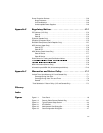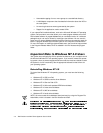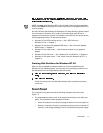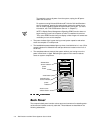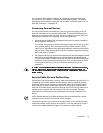
1-2 Dell Precision 610 Mini Tower Systems User’s Guide
under operating systems that support multiprocessing, such as Microsoft
®
Windows NT
®
4.0.
A 16-bit, integrated Plug and Play Crystal CS4237B audio controller that is Sound
Blaster Pro-compatible and that supports the Microsoft Windows
®
Sound Sys-
tem. See Chapter 6, “Using the Integrated Audio Controller,” for details.
System memory that can be increased incrementally up to 512 MB using unbuf-
fered synchronous dynamic random-access memory (SDRAM) dual in-line memory
modules (DIMMs), or up to 2048 MB using registered SDRAM DIMMS.
The memory subsystem also provides ECC capability, which corrects all single-bit
memory errors and detects all multibit errors. See “Adding Memory” in Chapter 9
for details on installing additional memory.
Self-Monitoring Analysis and Reporting Technology (SMART) support, which
warns you at system start-up if the hard-disk drive has become unreliable. To take
advantage of this technology, you must have a SMART-compliant hard-disk drive
in the computer. All enhanced integrated drive electronics (EIDE) and small com-
puter system interface (SCSI) hard-disk drives shipped with Dell Precision 610
systems are SMART-compliant.
The system’s basic input/output system (BIOS), which resides in flash memory
and can be upgraded remotely or by diskette if required.
Plug and Play capability, which greatly simplifies the installation of expansion
cards. Plug and Play support included in the system BIOS allows you to install a
Plug and Play expansion card without setting jumpers or switches or performing
other configuration tasks. The ISA Configuration Utility (ICU) allows you to config-
ure an existing ISA expansion card for conflict-free operation. Also, because the
system BIOS is stored in flash memory, it can be updated to support future
enhancements to the Plug and Play standard.
NOTE: The Windows NT operating system does not provide ISA Plug and Play
support. Therefore, some ISA Plug and Play cards (such as modem, sound, and
network cards) may not work with your Windows NT operating system unless
you configure them manually.
Wakeup On LAN capability, which, when enabled in the System Setup program,
allows the system to be started up from a server management console. Wakeup
On LAN capability also allows remote computer setup, BIOS upgrades, software
downloading and installation, file updates, and asset tracking after hours and on
weekends when local area network (LAN) traffic is at a minimum.
Universal Serial Bus (USB) capability, which simplifies connection of peripheral
devices such as mice, printers, and computer speakers. The USB connectors on
the computer’s back panel provide a single connection point for multiple
USB-compliant devices. USB-compliant devices can also be connected and dis-
connected while the system is running.






